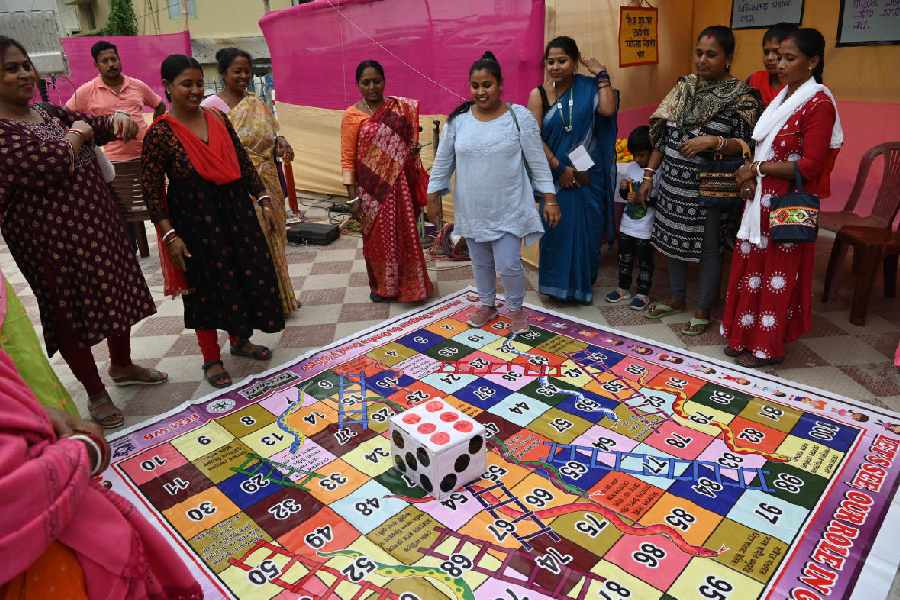A giant snakes-and-ladders board game had a group of women hooked at a programme in Dhakuria on Wednesday.
Words such as “child marriage” and “dowry” were written in the grids with snakes’ mouths. “Girls’ education” and “menstrual hygiene” were among those written at the base of ladders.
Every time a woman rolled a dice into the board, she had to stand on a grid where the dice landed. If it landed on a grid with the phrase “child marriage”, which was at a snake’s mouth, she had to climb several grids down to the snake’s tail.
In contrast, the dice landing on “girls’ education” — at the base of a ladder — would take her up on the board.
It was one of the several games at the programme — Gender Mela, organised by a rights group — on the premises where the Babubagan Durga Puja is held.
The participants, numbered over 250, were women from slums and colonies in south Calcutta and on southern fringes, such as Kasba, Dhakuria, Cheena Mandir, Patuli, Garia and Sonarpur.
The majority of them worked as cooks, maids, ayahs and caregivers. Some were homemakers.
“These women have to face discrimination almost everywhere. Marital abuse is not uncommon. The men often come home drunk and beat the women up. The women have to take care of all the domestic chores besides going out for work. The employers treat them with bias. They are usually the first suspects in a theft case,” said Kakuli Deb of Parichiti, an NGO that works to empower marginalised women and ensure better working conditions for them.
A unit of the Delhi-headquartered Centre for Health and Social Justice (CHSJ), Parichiti provides legal and psycho-social support to the survivors of violence through crisis support centres.
Wednesday’s programme was the culmination of a two-week campaign that focussed on community outreach programmes.
“We have organised interactive games, instead of heavy-duty stuff like seminars and lectures, for real engagement of participants,” said Deb.
In another game, a rotating dartboard led participants to a box of questions related to property rights.
“Can a father deprive his daughter from the wealth he has inherited,” was one question.
The answer was: “No”.
“Can a father deprive his daughter from the wealth that he has created,” read another.
This time, the answer was: “Yes”.
Women mentored by Parichiti, who have stood up to bias, are now at the helm of local groups, called Samadhan Dal (Solution Group).
They reach out to vulnerable women in their neighbourhoods. A handful of men, who are breaking the stereotype by sharing domestic work with the women in their families, also volunteer for Parichiti.
Santi Mondal, 45, who lives in Chowbaga near the Ruby hospital, was a member of one such local group. She was at the forefront of a protest campaign when a woman from her neighbourhood — who worked in an apartment in a gated community off EM Bypass — was branded a thief when a chain went missing from the flat.
“Posters with her face had been put up in the lobby, as a warning to the residents. But eventually the chain was found inside a sunglass case in the same flat. The owner was forced to tender an apology. It felt like a victory for all of us,” said Mondal.
“The nature of discrimination is similar, be it the Delhi or Bengal. The same people who have no problems in eating food cooked by these women cannot take the same lift with them,” said Shilpa Bisht, executive director of (CHSJ), who attended the programme.
